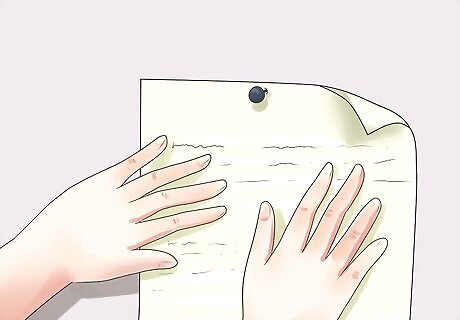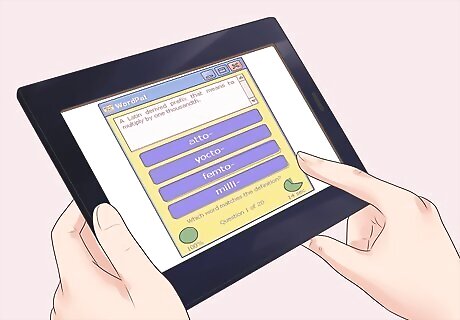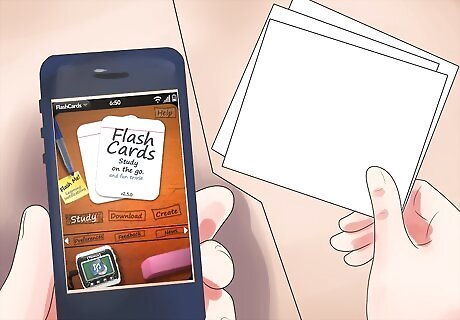
views
Creating Associations

Create word associations. Whether you're learning vocabulary in your native language or a foreign language, associations can help you memorize new words. Absurd, vivid, or ridiculous associations are the most likely to help you retain your new vocabulary. If you’re learning a foreign language, associate new words with words in your native language. If a new word resembles a word in your native tongue, create a mental image association between the native word and the new word. For example, the French word “vin,” or wine, sounds similar to the English word “van,” so you might make a visual association of a van full of wine to help you remember. Word associations are also helpful if you’re learning a new word in your own language. For example, the beginning of the word “curtail,” which means to cut short, resembles the beginning of the word “curtain,” so you can make a mental association of curtains cut too short to help you remember “curtail.” When creating word associations, be sure to visualize the image vividly and to review it in your head several times a day so the association will become hardwired into your memory.

Use mnemonics. A variation on the “similar word association” technique, mnemonic devices use patterns to assist your memory. For example, the word “abrogate,” which means to deny or cancel, can be broken down into a pattern of images based on the series of letters that make up the word. So, you might break “abrogate” down into “a”+”bro”+”gate” and then visualize a bro standing at your gate while you "deny" him entrance. For example, "PEMDAS" is a popular math mnemonic, while "FANBOY" is a popular English grammar mnemonic. Like word associations, mnemonic techniques work best when they relate new concepts to concepts already in your knowledge base.

Be as creative as possible. It’s often easier to remember unusual or bizarre things rather than banal ones, so get creative with your associations. For example, the term “banal” means “boring or everyday,” so to help you remember its definition, you might picture a banana peel (because the beginning of “banal” resembles the beginning of “banana”) floating in a canal (because “canal” rhymes with “banal”). A banana peel floating in a canal is a vivid enough image to remember, but it also captures an image of something banal, allowing you to associate “banal” with the definition “boring or uninteresting.”
Making an Interactive Learning Environment

Integrate the new words into your environment. Post sticky notes or hang large blank pieces of paper in places you frequent, like the bathroom or kitchen. Add new words and their definitions to the hanging paper as you encounter them. That way you’ll find yourself frequently encountering them as you go about your day. Include a written definition of the word if you’re struggling to remember it. You can also draw a small picture depicting the meaning of the word beside it to help you build the association. For foreign vocabulary, try writing words for everyday objects like "mirror" and "table" on sticky notes. Attach the sticky notes to the objects the words refer to to strengthen the association between the word and the object in your mind.

Make the new words part of your life. Writing new words into sentences that are relevant to your own life can help you build strong and relevant associations. For example, if you want to learn to use the word “azure,” a term for a deep blue color, write it into several sentences that relate to your current situation or surroundings: “My new shampoo bottle is a striking azure color” or “the sky this summer has been a particularly vivid azure.”

Turn learning into a game. The more fun you can make your vocabulary learning time, the more likely you are to do it and to learn from it. There are a number of vocabulary-learning games accessible online. For a listing of web-browser based games, go here. If you prefer a game you can play offline, see EdHelper’s Board Game Generator.

Make a visual record of your work. This technique will be particularly helpful to you if you're a visual learner. Another tool that is great for learning vocabulary words is Quizlet! Create a vocabulary journal or notebook and write out new words and their definitions. Write them as often as you need in order to set them in your memory. Create stories using your new words. You can write stories that simply incorporate the new words into a narrative, or you can challenge yourself to write a story using only your vocabulary words. Draw pictures depicting the meaning of your vocabulary words to accompany their definitions. Create a visual storyboard if you like to express yourself artistically.
Practicing Your Techniques

Find the methods that work best for you. You may need to try out a number of different learning techniques before you find those that work best for you.

Practice with flashcards. One of the most time-honored techniques, flashcards remain a simple but powerful tool for vocabulary practice. Write down each new word you learn on the front of a small note card or piece of paper, then write its definition on the back. Run through the flashcards several times each day, trying to remember the word’s definition before checking on the back. There are a variety of flashcard apps available for Android and Apple devices that can make using flashcards even more portable and accessible. Do some research and find which one would work best for you.

Expose yourself to new words. Read texts at your desired vocabulary level in the target language. Reading and looking up--and writing down!--new words while doing so is an excellent way of building and practicing vocabulary. If you’re trying to elevate your vocabulary in your native language to, for example, the university level, read academic journal articles, The New Yorker, The New York Times, etc. If you’re trying to learn a new language, read texts at your current skill level or just slightly above it. So if you’re just beginning to learn, reading books for young children may help you establish the fundamentals. If you’re at an intermediate level, you can read books for young adults. You may try to find simplified or summarized versions of longer stories that you already know. Also, look for subjects which you are interested in. You may even recognize a few words that are similar to your native language and that will boost your confidence. Reading a book you’re familiar with in your native language that has been translated into your target language can be a fun and effective way to practice your vocabulary and language skills.

Test yourself. Giving yourself frequent vocabulary tests will help you work on words that pose a particular challenge. A number of websites offer online vocabulary quizzes to help you practice. There are some that allow you to select your level, desired quiz length, and vocabulary word category, and others like this that allow you to create custom quizzes using the specific list of words you provide.

Use your new words as often as possible. Use new vocabulary words in your daily conversation, in your writing, and at any other opportunity you have. The more you use the new words, the more completely you’ll understand and remember them.




















Comments
0 comment